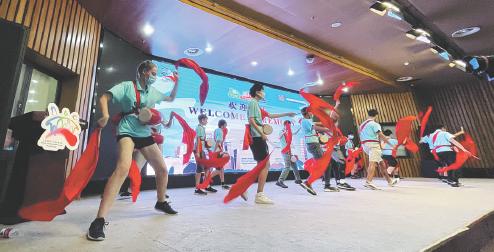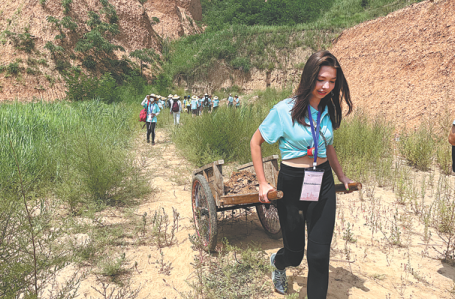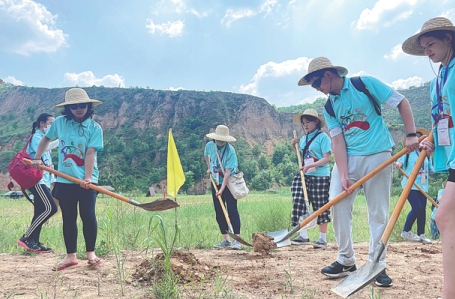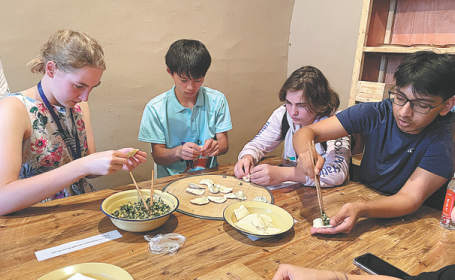Students get a history lesson
International group visits the cradle of Chinese revolution, Zhou Wenting reports in Yan'an, Shaanxi.

Teenagers took a step into history when they visited Yan'an, the cradle of the Chinese revolution, in Shaanxi province. As members of 16th Shanghai International Youth Interactive Friendship Camp, they were touring Chinese cities and they said that learning about Yan'an had been fundamental to helping them understand the country's development today.
During their visit to the city on July 16-17, the 39 teenagers from China and 15 other countries went to places, such as Liangjiahe village where President Xi Jinping used to work as a farmer from 1969 to 1975.
They also went to Yangjialing village, a former site of the Central Committee of the Communist Party of China and where Party leaders at that time, including Chairman Mao Zedong, resided from 1938-47.
The youth camp was organized by the Shanghai People's Association for Friendship with Foreign Countries, the Shanghai Youth Federation and the Shaanxi Provincial People's Association for Friendship with Foreign Countries.
All the participants this year were from local or international schools in Shanghai rather than overseas because of the COVID-19 pandemic.
The teenagers, from countries including Australia, Japan, the United States, Russia, South Korea, India, Spain and Sweden, also learned about the traditional yangko dance and folk songs, as well as how to make dumplings.
For most, this was their first time in the city of special significance in the Chinese revolution and the CPC's history.
"Liangjiehe village is absolutely beautiful and the history of how it developed also reflects people's rising living standards in Yan'an and the country as a whole," says 16-year-old Isabel Katharine Braithwaite from Sweden.
Elizaveta Koposova from Russia says that the visit to Yan'an allowed her to learn more about China's past and think about how China has gone about achieving its development.
"We live in Shanghai, a modern city, and the tour in Yan'an helped us learn about the country from another perspective," says the 17-year-old.
After seeing this part of Chinese history, she learned that Chinese people used to live a hard life and they were eager to get out of it. "Their life and living environment was changed enormously because of their diligence," she says.
In the 1960s and '70s, 15 youths from Beijing, including Xi, came to Liangjiahe and experienced difficult and unforgettable times. Back then, the terrain was rough and undulating, there was no water in what is now a river, no trees on the mountain slopes and the fields were untilled.
However, the village today has access to natural gas, the internet, tap water and new infrastructure. The elderly have pensions, the children get a good education and citizens have comprehensive medical insurance, making life nearly on par with city life.
"It was interesting to see in the village the simple bed that Xi shared with several other youths and some other items he used during his stay here working as a farmer," says Kirara Endo, a 14-year-old Japanese girl.
The teenagers also got to try their hand at building sediment storage dams in the village. They learned Xi had worked as the Party secretary of the village in 1974 and that the first thing he did was to guide the villagers to build such dams for the purpose of gathering soil in land degradation areas.
"When we cooperated to experience the labor work in the village, we could feel how much effort the residents here had made to turn this place from an impoverished countryside region to a prosperous land. I'm proud of the country's total triumph in poverty alleviation," says Jia Mingxuan, a 14-year-old girl from Shanghai.
During the trip, the teenagers also learned about the foreigners who helped Yan'an and supported the Chinese in areas like healthcare, culture and education.
These foreigners include Edgar Snow from the US, the first Western journalist to give a full account of the history of the CPC following the Long March, and Erwin Engst, a US agro-pastoral specialist who assisted with agricultural developments and later participated in China's socialist economic construction.
At Yangjialing village, the teenagers listened to the narration of Norman Bethune, a member of the Communist Party of Canada and a well-known thoracic surgeon. Bethune died in China in November 1939 after he was infected during surgery on a patient.
"Bethune's story shows his dedication to medical work and his humanitarian spirit is really amazing. I also want to be a doctor who helps people with knowledge and practice in science and medicine," says Braithwaite.
"I didn't realize before the Yan'an visit that foreigners from different backgrounds were in China and the support from the international community also helped make China what it is today," says the Swede, who moved to Shanghai with her parents and two siblings because of her father's career.
Liu Suping, director of the Europe and Asia division of the Shaanxi Provincial People's Association for Friendship with Foreign Countries, says: "We sincerely hope that more youths can follow the example of those international friends and deepen the friendship between China and the international community in the new era."
The camp participants say they enjoyed the time together and were delighted to have the opportunity to communicate with peers from different countries in a time when the world is still stricken by the pandemic.
Jaden Ng from Singapore says that he felt a strong sense of teamwork when the participants worked together to build the dams-some were responsible for shoveling and transporting the soil, while others paving and tamping.
Braithwaite notes that it was exciting to interact with teenagers from different parts of the world because the culture at the school she attends in Shanghai is predominantly British.
During the camp, Mingxuan from Shanghai also shared some knowledge about traditional Chinese medicine, which she is interested in.
"I hope we can become messengers of friendships," says Mingxuan, whose roommate during the camp was a girl from Spain.
She says they were sure that they would keep in touch after the camp.
Cao Haijiong, director of the Europe and Asia division of the Shanghai People's Association for Friendship with Foreign Countries, says that the past 15 editions of the event had built up friendship between the participants from home and abroad. Many former campers still keep in close contact with each other.
"When the COVID-19 virus struck China early last year, we received videos from former international campers who wished our country well," says Cao.
"Also, we sent face masks to some foreign countries through our sister organizations overseas when they were in need of them."





Today's Top News
- China bids to cement Cambodian-Thai truce
- Fiscal policy for 2026 to be more proactive
- Revised law to spur high-level opening-up
- High-speed rail mirror of China's modernization
- China will deliver humanitarian aid to Cambodia
- The US 2025: a year of deep division






























